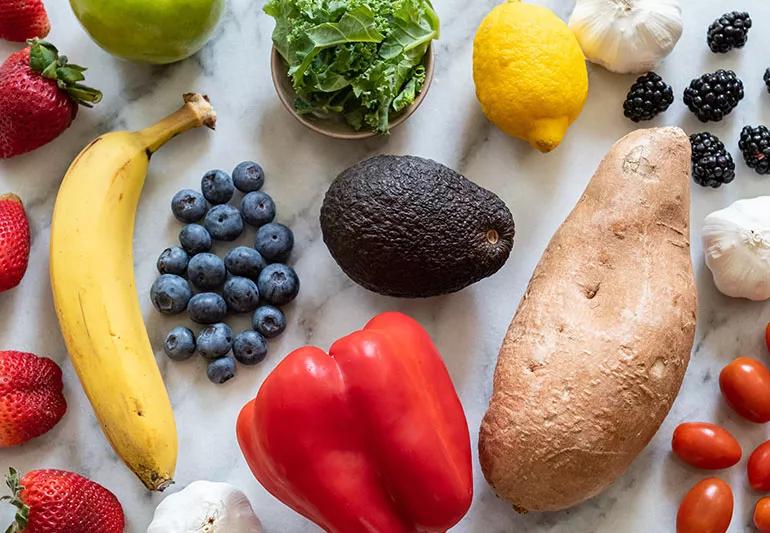A dietitian offers advice on moving past a misstep

Midway through cleaning out your car after another on-the-go week, a growing pile of crumpled fast food wrappers reveals a harsh reality: Your efforts to eat healthier definitely took a wrong turn.
Advertisement
Cleveland Clinic is a non-profit academic medical center. Advertising on our site helps support our mission. We do not endorse non-Cleveland Clinic products or services. Policy
It happens, says registered dietitian Kate Patton, MEd, RD, CSSD, LD. The key is what comes next. Here are some tips to get you back on track.
You’ve heard the phrase “don’t cry over spilled milk,” right? Well, don’t cry over a weekend binge of deep-fried chicken wings, either. There’s no benefit to heaping guilt on your plate for past chews.
Bad food days are part of life, whether it’s the result of scheduling pressures, stress eating during the pandemic or simply the lip-licking lure of decadent desserts.
Patton advocates an 80-20 rule for watching dietary intake: “If you’re eating what you should 80% of the time, you’re doing pretty well,” she says. “It’s OK if you have a cheat meal here and there. Just don’t let it get out of hand.”
Hit the reset button on healthy eating habits as soon as possible after a misstep to get yourself moving in the right direction, says Patton. Focus on keeping a one-day setback from ballooning into a one-week setback.
Consider planning out meals for the week ahead to restore your routine, and maybe add in a new recipe or food item to spice things up. Stock your fridge with nutrient-rich fruits and vegetables for when you crave a midday nibble.
Advertisement
Learn from your eating misadventures, too, Patton says. If life’s hectic pace continually leads to greasy drive-thru dinners, arrange alternatives such as nutritious meals packed in a car cooler or pre-made dishes that can be plated as soon as you get home.
Using a food tracking app or journal to better understand your eating routine could help pinpoint and address persistent stumbling blocks to your dietary goals. “It’s a great way to understand the ‘why’ behind your behaviors,” says Patton.
One of the easiest ways to climb back on the healthy eating wagon is to slow it down at mealtime. Gobbling down food often leads to overeating. “It takes 20 minutes for your stomach to tell your brain that it’s full,” says Patton. “Don’t get ahead of it.”
Patton recommends setting down your fork between bites to reduce the plate-to-mouth food transfer pace. Adding in sips of water applies the brakes, too, while also helping to fill you up and curb your appetite.
The tactic is especially effective at parties, where tackling a buffet can lead to mass consumption in a hurry. “Eating slower is one way to eat healthier,” says Patton. “It’s a good habit to build.”
Building a healthy diet isn’t something that’s done or undone in a single day. Instead, it’s a process best measured over months and years. It’s more important to develop lasting routines then to fixate on a momentary stumble.
Keep that in mind before fretting over the dent you put in a just-opened bag of potato chips.
“As long as you understand the bigger goal, you’ll be fine,” says Patton. “Be in it for the long haul.”
Advertisement

Sign up for our Health Essentials emails for expert guidance on nutrition, fitness, sleep, skin care and more.
Learn more about our editorial process.
Advertisement

This color additive, found in many pre-packaged foods, may affect people with ADHD or allergies

With a focus on internal cues for hunger and fullness, this eating style may revolutionize your relationship with food

Review the ingredients, watch for sugar and fat, and choose one with the right amount of protein for your needs

Getting the hang of portions can help you better understand how much to put on your plate

A typical recommended balanced diet is half fruits and veggies, a quarter protein and a quarter grains

Foods high in protein, fiber and water can help keep hunger at bay

This quirky food trend is harmless, as long as you’re getting enough protein, fiber and healthy fats

With a little planning, you can fill your belly and boost your energy

Even small moments of time outdoors can help reduce stress, boost mood and restore a sense of calm

A correct prescription helps your eyes see clearly — but as natural changes occur, you may need stronger or different eyeglasses

Both are medical emergencies, but they are very distinct events with different causes